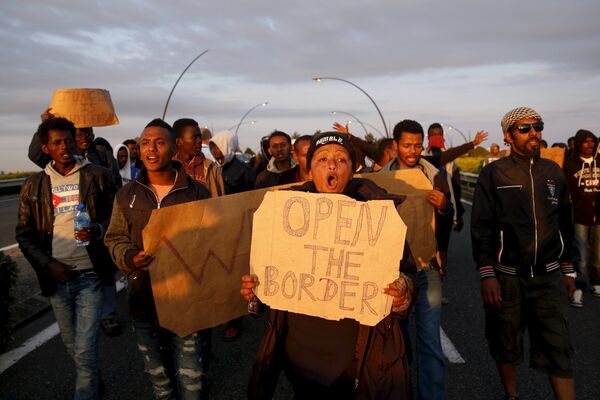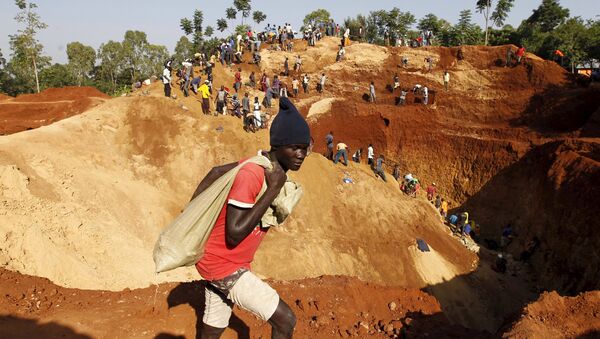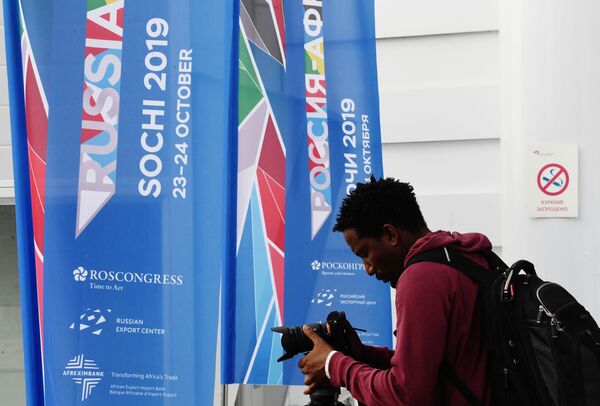Sputnik: Do you think the focus of the European Union right now is more on importing to and exporting from Africa or investing in Africa?
Giros Étienne: I think now the thoughts have a little bit changed. Now, due to migration and questions and problems of security, the European Union, in my opinion, is totally convinced that the future of this continent is in creating value and creating jobs.
So, that pushes us to be in more favour of investment and co-investment with local interests than purely of exportation. And there's also another consequence, which is that the European Union now is much more in favour of the private sector because only the private sector can achieve this goal of creating value and jobs.
Sputnik: What EU countries are the most interested in investing in and cooperating with Africa? Could you explain your opinion?
Giros Étienne: Africa has a great skill, which is that Africa can make extraordinary recoveries. When a country has a revolution, is bankrupt or has a problem, we can recover within six months.
My answer is not definitive. The situations can change very quickly, but you can easily see three or four places in Africa, North Africa – five countries in North Africa, because Libya has very difficult times, Tunisia has a huge potential, but there's still a big question mark – in the West, there's Senegal, it's an extraordinary country with 8 per cent growth, with no special capacity of the country; Ivory Coast, and also on the other side [Kenya] and Eastern Africa with Burundi, Rwanda and so on and, of course, South Africa.
But out of 54 countries, it's easy to find 30-40 countries to invest in. As for EU countries, I think the first ones are France and Germany, which are very keen on Africa. The UK still remains interested in Africa, but there's a little bit less dynamic than in France and Germany. You also have the Netherlands, Norway as well; and also the Mediterranean countries, Portugal and Spain. That's Old Europe.
As for the New Europe, there's, obviously, Russia, which seems to us very much interested in Africa. The UK is very clever, they have a long experience in Africa; but I see one thing that guides them very much to choose where to invest: profitability, and the question of how I can do business in this country.
I think that Germany, France and the European community, the EU in general, sometimes have larger interests, diplomatic, military, security, educational, social and even cultural, towards those countries. I think that's the difference with the UK.

Sputnik: Which African sectors does France invest in the most? Why?
Giros Étienne: To answer your question, you have to take into consideration that new actors are now active in Africa, China, Russia, Turkey. And those countries have taken over certain sectors, for example, mining as a first sector, and so on.
Our companies, from France and Germany, are very far from investing strongly in those sectors, for example, roads, civil works, and so on. It's very difficult for our companies to compete with Russia, China, Turkey and so on.
But there are still huge sectors available to us. For example, the first one is urbanisation, city building, the new city, the smart city; and I think we are very strong in those areas. We can operate very efficiently and with good solutions to this huge challenge for Africa; which is that the population in the cities will double within ten years.
The second example is agriculture; and the third one is the services, generally speaking, computers, education, and so forth. So, there are still very large sectors available to our companies.
Sputnik: African trade ties with other countries, beyond the continent, are much more effective than ties within the African continent. Generally speaking, trade between the EU and Africa is greater than the volume of trade between the five largest countries on the continent. Would you say this is an accurate assessment? If not, why? Will Africa be successful over the long-term?
Giros Étienne: To answer your question, you have to note that the weakness of trade between the African countries is due to the fact that – it was exactly the subject of the debate – the productivity is not good enough and the markets are small. Probably you know this number, 12 per cent of the GDP of the African countries is dedicated to local trade; in Europe, it's more than 45 per cent.

For example, French industry is producing approximately half for other European countries; African countries are only producing 10 per cent for other countries.
You see the gap. But the figures are, nevertheless, quite high, because of raw materials – don't forget that in trade figures between Europe and Africa, Africa is exporting a lot of raw materials to Europe, and, of course, that increases the numbers, coal, wood, timber, cotton, sometimes rice and so on.
Sputnik: "If you want to be invested in, you have to be attractive", we heard this during the plenary session. My question is, what steps should be taken by African governments to be more attractive to foreign investors?
Giros Étienne: That's quite an easy question. First, [there should be] good governance. Secondly, [they should] set up a favourable climate for business, in favour of companies and entrepreneurs; not to help them but to let them have a perspective in their investment, in their risk. I invest €10 million in this country, what will the situation be in ten years? Will the rules change? What is the rule of law, and so on?
The third point is infrastructure. Without infrastructure, you cannot imagine that some big companies will invest in Africa. When you have [outages of ] electricity because somebody at a round table discussion said it would be solved, but then it is not solved.
For example, if you want to build a factory somewhere in Africa, you will have to produce your own electricity, you will have to build a road, you will have to build a railway track and so on. So, once this is resolved, there will be a big break for European investment.
Sputnik: You mentioned during the plenary session that "We have to de-risk Africa". What needs to be "de-risked" in terms of African economic leadership?
Giros Étienne: In my mind, the word "to de-risk", which is not a very nice and elegant word, means that the risk of Africa should not be a reason not to invest. It doesn't prevent us from investing because if you examine all the risks in Africa, every risk has an answer; except maybe a revolution or a war, an entrepreneur cannot do anything about that.

But unpaid incomes, for example, which is a risk; the second risk is the rule of law, for example in the PPP agreement the agreement, the contract, the MoU must be respected for 15-20 years, so you can take the guarantees on that, and you can also call the international organisation, such as the WTO or the World Bank, or the IMF.
So, you can find solutions to the risk, and not be prevented from investing in Africa because of supposed risks.
Sputnik: Does Europe or any other country invest in Africa because they want something good for Africa or because they want some benefits for themselves?
Giros Étienne: This is very simple, and you know it. Both, of course. Yes, we try to make money, of course; this is the principle of the private sector. And I must say that at the end of the day, the private companies are making money in Africa; it's sometimes difficult, it's sometimes difficult to convince your investment board and so on, but you make money at the end of the day.
But also we have the right, and we even have to provide an improvement in the social situation in those countries. And it is the difference, maybe, between old companies from Europe compared to new companies from new actors, our behaviour and attitude are good towards the country, the population; for example, the equality between male and female, the health, the views and so on. We follow those rules very strictly; I think this is the difference between competition with new actors.



